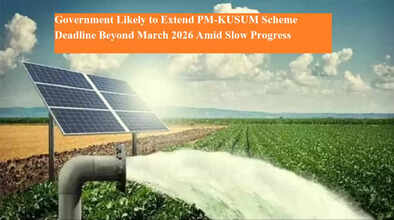Government Likely to Extend PM-KUSUM Scheme Deadline Beyond March 2026 Amid Slow Progress

The Indian government is considering extending the deadline for the Pradhan Mantri Kisan Urja Suraksha evam Utthaan Mahabhiyan (PM-KUSUM) scheme beyond March 2026, as several key components of the program have yet to achieve even half of their set targets. Despite earlier extensions due to the COVID-19 pandemic and implementation challenges, many states are still struggling to meet their goals under this solar power initiative for farmers.
Slow Progress Across PM-KUSUM Components
Launched in 2019, the PM-KUSUM scheme aims to make farmers energy self-reliant by promoting solar energy for agricultural purposes. It has three main components:
-
Component-A: Installation of small solar power plants.
-
Component-B: Deployment of off-grid solar pumps for irrigation.
-
Component-C: Solarization of existing grid-connected agricultural pumps.
According to official data up to September 2025, progress under the scheme has been uneven. Component-B has achieved around 71% of its target, but Component-A has seen only 6.5% completion. Shockingly, some states have not initiated a single installation so far, highlighting major gaps in state-level implementation.
Reasons Behind the Delay
The COVID-19 pandemic severely disrupted project execution during the initial years, leading the government to extend the scheme’s deadline to March 2026. However, despite the extension and revised targets, progress continues to lag behind expectations. Factors such as logistical challenges, high upfront costs, and lack of local technical capacity have also slowed the pace of implementation.
Given these challenges, the government is now weighing another extension to ensure that all set objectives are fully met. The proposed deadline extension would also allow state governments and implementing agencies more time to coordinate efforts and address the current bottlenecks.
Objective of the PM-KUSUM Scheme
The PM-KUSUM scheme was launched with a vision to reduce farmers’ dependence on diesel and electricity by promoting the use of clean and affordable solar energy for irrigation. It also aims to increase farmers’ income by allowing them to sell surplus power generated from solar panels back to the grid.
By shifting agricultural energy use toward solar power, the scheme seeks to cut fuel costs, reduce carbon emissions, and contribute to India’s broader renewable energy goals. Moreover, it aligns with the government’s target of achieving 500 GW of non-fossil fuel energy capacity by 2030.
Expected Impact of Deadline Extension
If the government officially approves the extension, it will provide crucial breathing room to all stakeholders involved — from state nodal agencies to private developers. The additional time will help in accelerating installations, streamlining administrative approvals, and enhancing participation from farmers.
Officials believe that extending the scheme timeline could help close the existing performance gap between states and ensure more equitable progress nationwide. The move is expected to boost overall confidence in India’s renewable energy sector while continuing to support rural livelihoods.
A Step Toward Clean and Sustainable Agriculture
Experts consider this possible extension a strategic and necessary step to secure the success of the PM-KUSUM program. As solar energy adoption grows in rural India, it will not only provide farmers with cheaper irrigation solutions but also empower them to become energy producers.
In the long run, strengthening this scheme could help India move closer to its clean energy transition goals while ensuring that the agriculture sector remains sustainable, profitable, and environmentally responsible.
With the government’s continued push for renewable energy, the PM-KUSUM scheme stands as a cornerstone of India’s commitment to empowering farmers through sustainable development.

